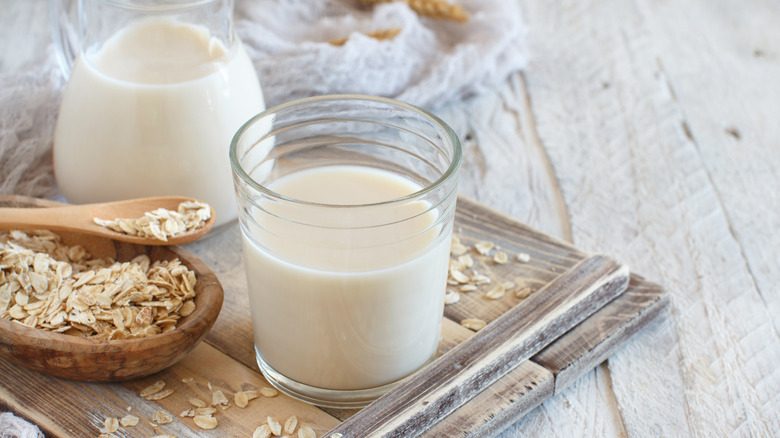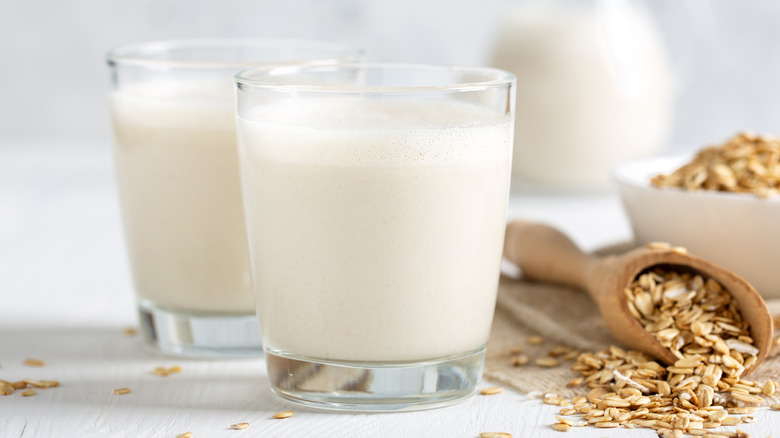How To Tell If Oat Milk Has Gone Bad
What'd you pour into your coffee this morning? In a three-month pilot experiment carried out in three locations across Southern California, Blue Bottle Coffee Lab found that 68% of coffee orders called for oat milk — and it's not just a California thing. They carried out the same pilot program in cafes across the East Coast, where 59% of customers also requested oat milk for their coffee. Now, instead of dairy milk, oat milk is served by default in every Blue Bottle coffee order. Major coffee chains such as Starbucks, Dunkin' Donuts, and Peet's Coffee carry it too (via Nation's Restaurant News).
Despite its unexpectedly recent origins, it is apparent that the oat milk craze is here to stay. While it still comes in second to almond milk on the popularity scale (via Food Dive), oat milk outperforms other milk alternatives with its low environmental impact, allergen friendliness, and mouthfeel that's comparable to dairy, according to Perfect Daily Grind. But, if you're only using it for the splash in your coffee every morning, it can take some time for you to finish a carton, and, whether it's refrigerated or shelf-stable, an opened carton of oat milk will go bad eventually.
But, with all the confusion behind "sell by," "use by," and "best by" food labels, to avoid drinking bad oat milk, all any of us can depend on is our own senses.
Visual cues
Telling whether or not your oat milk is still good can be a little tricky when relying on visual cues — that is, unless it's completely changed color or there's some noticeable mold, per Simply Oatmeal. But a significant key in deciphering if you're oat milk has gone bad is separation, which, inconveniently, can occur naturally in oat milk even if it hasn't gone bad.
According to Milk Pick, of the two main ingredients used by most oat milk brands – water and oats — there is a notable difference in the weight of the particles. Because the oat particles weigh more than water, they will separate if the milk has been sitting for a while. However, the difference between safe separation and unsafe is pretty apparent.
While you should always shake your oat milk before you pour it, Purewow recommends doing so and pouring it into a glass so you can inspect it. The shaking should've emulsified the oat and water particles back together. If it looks separated, or if parts of it look lumpy, it's more than likely spoiled.
Smell
If the visual cues don't lead you to any solid conclusion on the state of your oat milk, you can do the reliable sniff test. According to Simply Oatmeal, oat milk that's safe to drink has a sweet, nutty smell — similar to how it tastes. But, if you're unsure your oat milk has been in the fridge, and you're questioning its trustworthiness, open it up and take a whiff.
It's true; Your nose knows more than you think. Compared to the five taste receptors on our tongues, our noses can detect hundreds of smells (via Food Unfolded). In fact, as much as 95% of the food flavors you're able to experience come from your sense of smell. But, your sense of smell is also an essential tool in determining which food flavors you shouldn't taste.
So, if your oat milk has an off-putting, sour, or pungent smell, trust your nose and don't drink it.
Taste
Now, if your nose and eyes haven't steered you clear enough, you may want to test your luck with a taste test. But, be warned, this doesn't come without risk. While expired oat milk may still be safe to drink, drinking spoiled oat milk can lead to food poisoning, which includes symptoms such as intestinal inflammation, vomiting, and diarrhea (via Simply Oatmeal). Not to mention, if it isn't fresh anymore, the majority of vitamins or minerals that make your oat milk nutritious will have degraded.
Your best bet is to toss any suspicious-looking or smelling oat milk before doing a taste test. But, nonetheless, if that's what it's come down to for you, take a sip and, if it tastes even slightly off, trust your palate and stop drinking it. According to the USDA, spoiled foods will taste unpleasant, meaning that there's a chance they could've developed pathogenic bacteria (the kind that causes food poisoning).
Because there's no way to know what type of bacteria your spoiled oat milk contains, it's best not to risk it.



